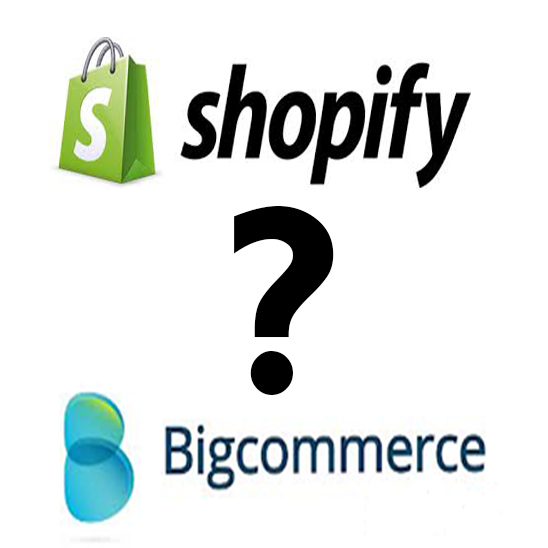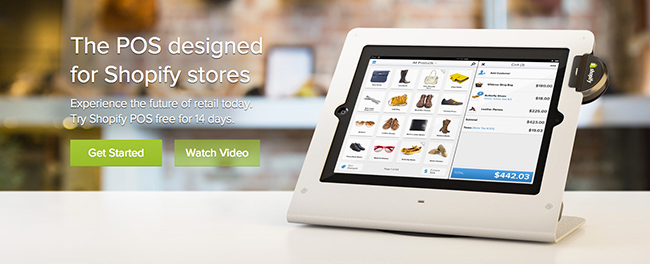 I've received a few questions lately about how to go about selling your DIY projects online. While it may seem like a daunting task, creating an ecommerce store to sell what you've made can open up lots of doors. Obviously the opportunity to make a bit of money is a huge incentive, but you also create a wider audience for yourself and your work. Another benefit is the ability to sell 24/7 – not just once a week at the local artisan market. There are a few highly trusted and reliable options for setting up an online store and shopping cart. The two prominent platforms I recommend looking into are Bigcommerce and Shopify. Both offer similar packages, but we'll look further into the details to help you make the right choice for your store.
I've received a few questions lately about how to go about selling your DIY projects online. While it may seem like a daunting task, creating an ecommerce store to sell what you've made can open up lots of doors. Obviously the opportunity to make a bit of money is a huge incentive, but you also create a wider audience for yourself and your work. Another benefit is the ability to sell 24/7 – not just once a week at the local artisan market. There are a few highly trusted and reliable options for setting up an online store and shopping cart. The two prominent platforms I recommend looking into are Bigcommerce and Shopify. Both offer similar packages, but we'll look further into the details to help you make the right choice for your store.
Pricing
If you take a look at the different pricing options for Bigcommerce and Shopify, you'll notice they look very similar. Both platforms offer three tiers of packages to choose from, but upon closer examination, they have slight differences that may matter to you and your store. The base package for each is the minimum you need for setting up a store, with Bigcommerce costing $34.95/month and Shopify ringing in at $29/month. Shopify's basic package is cheaper, but allows for less storage (1GB compared to Bigcommerce's 5GB). While Shopify has a no transaction fee across the board for every package they offer, Bigcommerce has a 2% transaction fee for it's least expensive option. On the topic of transaction fees, one thing to note is that if you already have a credit card processor, there is a very good chance you can use them. The mid-level package, which both platforms boast as their most popular, is more expensive, but you get more features and support than the basic level. Bigcommerce charges $79.95 and Shopify charges $79 for the mid-level package. It is almost the same price, though Bigcommerce gives you unlimited storage, while Shopify provides 5GB. Both platforms provide extra features not found in the basic packages.
One thing that Bigcommerce offers that Shopify does not is the option to register with annual pricing. If you plan on making your online store a long term investment, this could be a good option as you will save 10% compared to simply paying the month-to-month price. If you're simply testing out the waters with selling your projects online, this may not be the best option.
Design & Setup
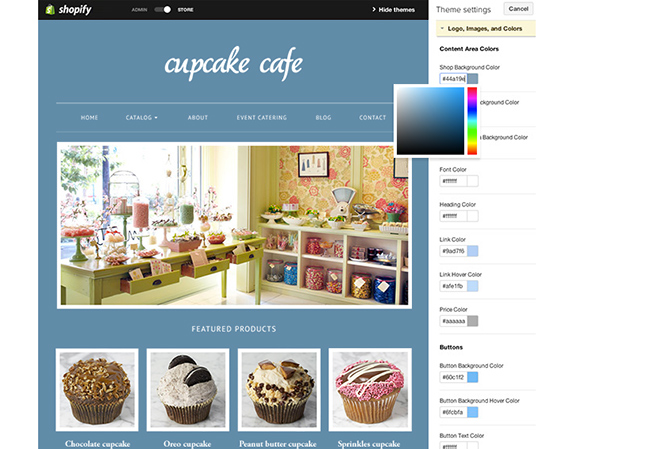 Bigcommerce and Shopify both strive to make setting up an Ecommerce storefront incredibly simple. Both platforms have large databases of 100+ customizable design themes for your store, so having an attractive storefront is easy. The templates they have are easy to setup, so no need to stress about web design skills you may or may not possess. If you do have that skill set, you are able to add CSS and HTML to further customize your store if you'd like complete control. Both sites also have developers and designers available for hire to make your storefront really stand out. Both Bigcommerce and Shopify make having a beautiful design a breeze, but if design and color is important to your website, Shopify offers more freedom to adjust your color palette any way you'd like, down to the very last link.
Bigcommerce and Shopify both strive to make setting up an Ecommerce storefront incredibly simple. Both platforms have large databases of 100+ customizable design themes for your store, so having an attractive storefront is easy. The templates they have are easy to setup, so no need to stress about web design skills you may or may not possess. If you do have that skill set, you are able to add CSS and HTML to further customize your store if you'd like complete control. Both sites also have developers and designers available for hire to make your storefront really stand out. Both Bigcommerce and Shopify make having a beautiful design a breeze, but if design and color is important to your website, Shopify offers more freedom to adjust your color palette any way you'd like, down to the very last link.
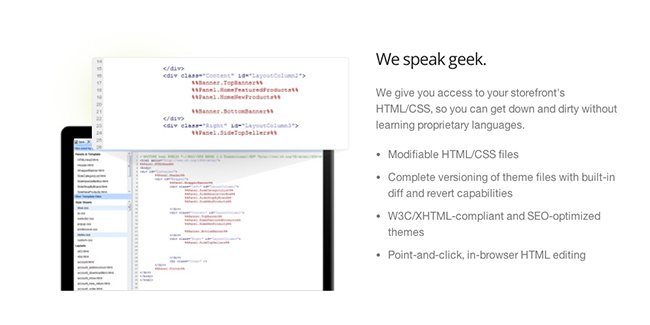 As far as the actual shopping cart, Bigcommerce and Shopify make it easy to start selling right away. You are able to accept or choose many different forms of payment, shipping options, languages, and currencies, and be confident that the checkout process is simple and secure. Your online store will be a fully functioning website, complete with navigation, content pages, and even a blogging platform. With design and setup made this simple, it is possible to get your storefront up and running within a day.
As far as the actual shopping cart, Bigcommerce and Shopify make it easy to start selling right away. You are able to accept or choose many different forms of payment, shipping options, languages, and currencies, and be confident that the checkout process is simple and secure. Your online store will be a fully functioning website, complete with navigation, content pages, and even a blogging platform. With design and setup made this simple, it is possible to get your storefront up and running within a day.
SEO & Marketing
You don't have to be a marketing wizard to sell your DIY creations and get your name out there. Built-in search engine optimization for both Bigcommerce and Shopify users is something that sets these two platforms apart from other shopping carts. Getting your store to show up in search results will grow your audience and reach and will ultimately help you to be more successful selling online.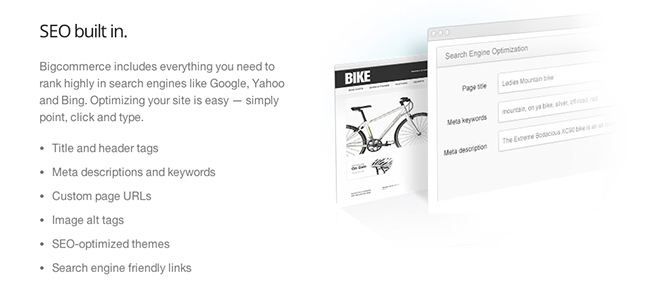 Other marketing strategies are simple as well. Businesses small and large integrate social networking into their marketing plans, and you can easily do the same with Bigcommerce and Shopify, allowing customers to share your store and products across tons of social media sites. You can also utilize targeted email marketing, create coupons or discount codes for your products, and get the 411 on your sales with detailed analytics. Both platforms offer advertising credits with Google AdWords, and new Shopify users also receive a $50 credit for advertising on Facebook.
Other marketing strategies are simple as well. Businesses small and large integrate social networking into their marketing plans, and you can easily do the same with Bigcommerce and Shopify, allowing customers to share your store and products across tons of social media sites. You can also utilize targeted email marketing, create coupons or discount codes for your products, and get the 411 on your sales with detailed analytics. Both platforms offer advertising credits with Google AdWords, and new Shopify users also receive a $50 credit for advertising on Facebook.

Apps
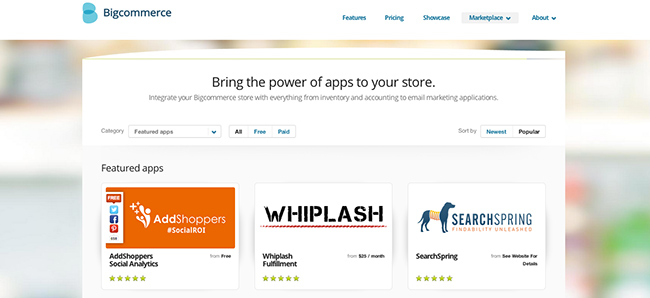 Bigcommerce and Shopify users are able to integrate many different apps and plugins for their store with just the click of a button. Apps can go a long way in helping your store be successful. Anything your online store might need is almost certain to be an app, offering straightforward ways to manage inventories, track shipments, attract new visitors, and everything in between.
Bigcommerce and Shopify users are able to integrate many different apps and plugins for their store with just the click of a button. Apps can go a long way in helping your store be successful. Anything your online store might need is almost certain to be an app, offering straightforward ways to manage inventories, track shipments, attract new visitors, and everything in between.
One thing that Shopify offers that Bigcommerce does not is it's own point of sale iPad application, Shopify POS. If you plan on selling both online and in a physical retail setting, like an arts bazaar, you can effortlessly sync products and orders with your online store to keep everything accurate and up-to-date.
 Etsy
Etsy
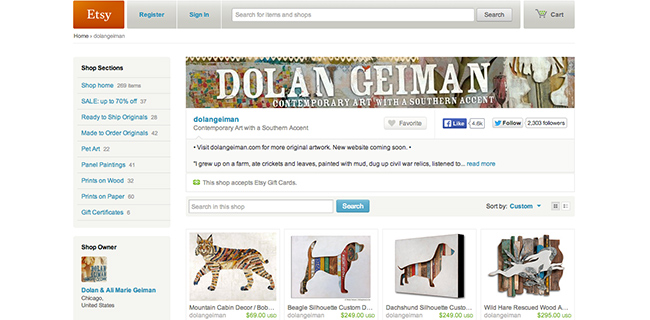 Both Bigcommerce and Shopify are fantastic, powerful platforms for setting up an online store. It is much easier than you'd think to sell your DIY projects online, and it is a worthwhile investment for the weekend hobbyist or the seasoned businessman or woman. If the thought of setting up a personal Ecommerce site still seems like a big step, Etsy might be a suitable alternative. Etsy is a online marketplace for DIY'ers, crafters, and artists. They take the DIY out of setting up an online store, so you can focus solely on your craft and what you want to sell.
Both Bigcommerce and Shopify are fantastic, powerful platforms for setting up an online store. It is much easier than you'd think to sell your DIY projects online, and it is a worthwhile investment for the weekend hobbyist or the seasoned businessman or woman. If the thought of setting up a personal Ecommerce site still seems like a big step, Etsy might be a suitable alternative. Etsy is a online marketplace for DIY'ers, crafters, and artists. They take the DIY out of setting up an online store, so you can focus solely on your craft and what you want to sell.
I hope this post demystifies the process of creating an online store and inspires you to sell your own amazing DIY projects!

